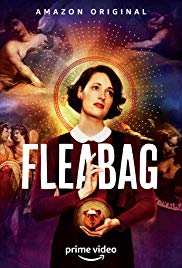
Three years ago, Amazon purchased the rights to the BBC comedic TV series “Fleabag.”
Based on her one-woman show, Phoebe Waller-Bridge brings her joke-shotgunning, eclectic, eccentric (and decidedly British) tale to television.
IMDB describes the show as the following:
A comedy series adapted from the award-winning play about a young woman trying to cope with life in London whilst coming to terms with a recent tragedy.
This is accurate, but there is so much more. And on May 17, 2019 – three years after the first season, the second and final season of “Fleabag” dropped. I had heard a lot of good things about “Fleabag” when it first came out; the reviews for the second season were basically saying the new season out-Fleabagged the outstanding first season.
Time to binge.
Each season has only six episodes of approximately 25 minutes each: I watched Season One last Saturday, Season Two the next day.
Six hours of incredible genius, brilliant writing, pathos and (overwhelmingly) oh-so-sly and did she really do that? humor.
We are introduced to Waller-Bridge’s Fleabag (listed in the credits as her character’s name, not that it – or any other name – is ever uttered in reference to her) as a damaged woman, trying to get past some grief with random, manic sexual hookups and generally odd behavior. The reasons for her grief are soon shown – the early death of her mother (never seen) and grief and guilt over the death of her closest friend, Boo, whom she has opened a cafe with (and whom we only see in flashbacks throughout the series).
Fleabag is not the only character that really isn’t named. Her father is Dad, her wicked Godmother (Olivia Colman, relishing every one of her evil utterances), and – in Season Two – a Catholic priest is just Priest (“What has gotten into your Priest,” instead of “What has gotten into Father O’Brian”). There’s also Arsehole Guy, Bus Rodent, Bank Manager and Hot Misogynist. Names are not needed; the characters just help fill Fleabag’s void.
In a touch of theater – this does all come out of Waller-Bridge’s play – Fleabag frequently breaks the fourth wall and directly addresses us, the audience. This happens more in the early episodes of Season One, where it’s often used as a set-up device (short episodes, so a direct comment to us about what a sleaze her brother-in-law is quickly gets us up to speed). This is a staple of the show, however, and actually how Fleabag wraps up – she walks away from the camera and at some distance away turns slightly back toward us and waves good-bye. Yes she – and the show – are (sadly) forever leaving us.
At bottom, this is a series – an utterly dense, bonkers series – about friendship, love and loss, mainly centered around Fleabag, her sister (Claire – a name!) her Dad and Godmother. In Season Two, the show ups the ante, and Fleabag fall in lust, and then love, for the very unorthodox Priest (often referred to “the hot priest”), who shares the same feelings – and no good can come of this.
I don’t know what to compare this to – the closest I can come is the British/American show “Catastrophe,” which also takes place in London. Different stories (“Catastrophe” is more about how to survive marriage and parenting), but both are brutally honest about real-world truths (Claire to Fleabag: “I’m not your friend; I’m your sister. Find your own friends.”), both are verbally profane and unafraid to show sexual activity, and both come at their issues from a different direction from what an American comedy might take.
“Catastrophe” – Whenever the American husband (Rob Delaney) gets a call from his wife (Sharon Horgan, met through an extended business-trip hookup), the caller ID is “Sharon London Sex” – they didn’t even know each other’s last names until he came back to London (Norris and Morris, respectively).
“Fleabag” – The Second Season premier (after “previously on ‘Fleabag'”) has Fleabag in a non-residential bathroom in an elegant black dress, attending to her bloody nose. Someone unknown knocks on the door and says, “They’re all gone; are you alright?” She says she’s fine, and then hands the paper towels she’s been using to an unknown woman kneeling on the floor, also with a bloody nose. What’s going on?
I’m glad I waited until the Second Season dropped to watch; that way I didn’t have to wait three years for the next. I did the same for “Catastrophe” (four seasons of six half-hour episodes), and that worked out well, for the same reason.
Waller-Bridge is in high demand these days – she was a writer on Season One of “Killing Eve,” is writing for the new Bond movie, and voiced a droid in Solo: A Star Wars Story. I hope she makes time for other small projects like “Fleabag,” because it is one of the biggest things I’ve watched in some time.
